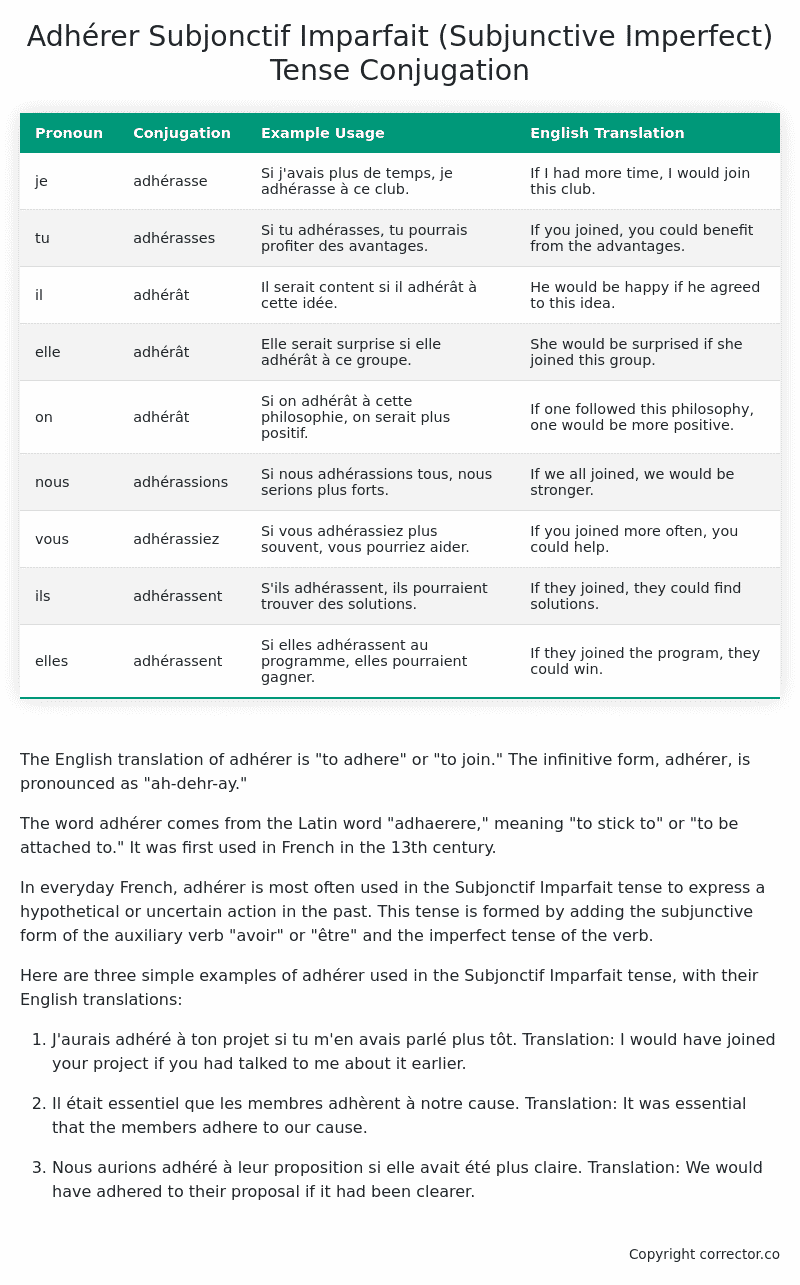Subjonctif Imparfait (Subjunctive Imperfect) Tense Conjugation of the French Verb adhérer
Introduction to the verb adhérer
The English translation of adhérer is “to adhere” or “to join.” The infinitive form, adhérer, is pronounced as “ah-dehr-ay.”
The word adhérer comes from the Latin word “adhaerere,” meaning “to stick to” or “to be attached to.” It was first used in French in the 13th century.
In everyday French, adhérer is most often used in the Subjonctif Imparfait tense to express a hypothetical or uncertain action in the past. This tense is formed by adding the subjunctive form of the auxiliary verb “avoir” or “être” and the imperfect tense of the verb.
Here are three simple examples of adhérer used in the Subjonctif Imparfait tense, with their English translations:
-
J’aurais adhéré à ton projet si tu m’en avais parlé plus tôt.
Translation: I would have joined your project if you had talked to me about it earlier. -
Il était essentiel que les membres adhèrent à notre cause.
Translation: It was essential that the members adhere to our cause. -
Nous aurions adhéré à leur proposition si elle avait été plus claire.
Translation: We would have adhered to their proposal if it had been clearer.
Table of the Subjonctif Imparfait (Subjunctive Imperfect) Tense Conjugation of adhérer
| Pronoun | Conjugation | Example Usage | English Translation |
|---|---|---|---|
| je | adhérasse | Si j’avais plus de temps, je adhérasse à ce club. | If I had more time, I would join this club. |
| tu | adhérasses | Si tu adhérasses, tu pourrais profiter des avantages. | If you joined, you could benefit from the advantages. |
| il | adhérât | Il serait content si il adhérât à cette idée. | He would be happy if he agreed to this idea. |
| elle | adhérât | Elle serait surprise si elle adhérât à ce groupe. | She would be surprised if she joined this group. |
| on | adhérât | Si on adhérât à cette philosophie, on serait plus positif. | If one followed this philosophy, one would be more positive. |
| nous | adhérassions | Si nous adhérassions tous, nous serions plus forts. | If we all joined, we would be stronger. |
| vous | adhérassiez | Si vous adhérassiez plus souvent, vous pourriez aider. | If you joined more often, you could help. |
| ils | adhérassent | S’ils adhérassent, ils pourraient trouver des solutions. | If they joined, they could find solutions. |
| elles | adhérassent | Si elles adhérassent au programme, elles pourraient gagner. | If they joined the program, they could win. |
Other Conjugations for Adhérer.
Le Present (Present Tense) Conjugation of the French Verb adhérer
Imparfait (Imperfect) Tense Conjugation of the French Verb adhérer
Passé Simple (Simple Past) Tense Conjugation of the French Verb adhérer
Passé Composé (Present Perfect) Tense Conjugation of the French Verb adhérer
Futur Simple (Simple Future) Tense Conjugation of the French Verb adhérer
Futur Proche (Near Future) Tense Conjugation of the French Verb adhérer
Plus-que-parfait (Pluperfect) Tense Conjugation of the French Verb adhérer
Passé Antérieur (Past Anterior) Tense Conjugation of the French Verb adhérer
Futur Antérieur (Future Anterior) Tense Conjugation of the French Verb adhérer
Subjonctif Présent (Subjunctive Present) Tense Conjugation of the French Verb adhérer
Subjonctif Passé (Subjunctive Past) Tense Conjugation of the French Verb adhérer
Subjonctif Imparfait (Subjunctive Imperfect) Tense Conjugation of the French Verb adhérer (this article)
Subjonctif Plus-que-parfait (Subjunctive Pluperfect) Tense Conjugation of the French Verb adhérer
Conditionnel Présent (Conditional Present) Tense Conjugation of the French Verb adhérer
Conditionnel Passé (Conditional Past) Tense Conjugation of the French Verb adhérer
L’impératif Présent (Imperative Present) Tense Conjugation of the French Verb adhérer
L’infinitif Présent (Infinitive Present) Tense Conjugation of the French Verb adhérer
Struggling with French verbs or the language in general? Why not use our free French Grammar Checker – no registration required!
Get a FREE Download Study Sheet of this Conjugation 🔥
Simply right click the image below, click “save image” and get your free reference for the adhérer Subjonctif Imparfait tense conjugation!

Adhérer – About the French Subjonctif Imparfait (Subjunctive Imperfect) Tense
Formation
Common Everyday Usage Patterns
Interactions with Other Tenses
Subjonctif Présent
Indicatif Passé Composé
Conditional
Conditional Perfect
Summary
I hope you enjoyed this article on the verb adhérer. Still in a learning mood? Check out another TOTALLY random French verb conjugation!


